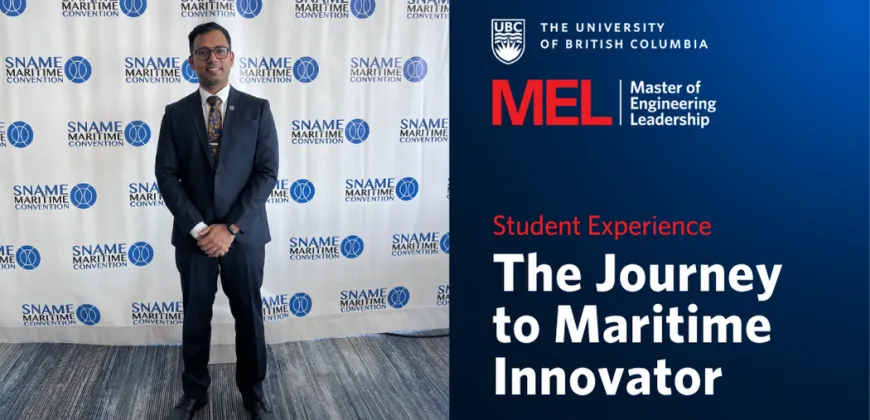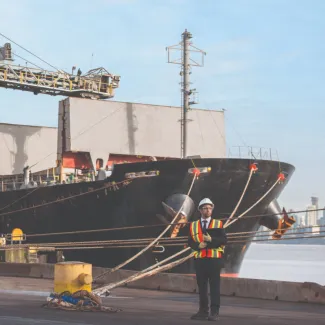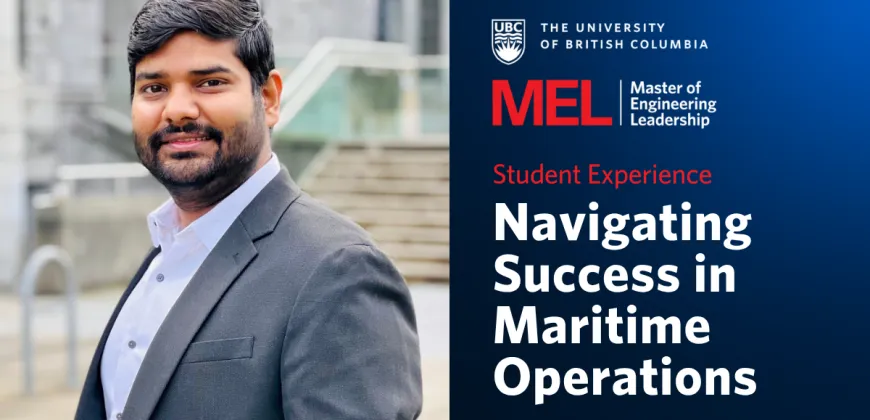The Journey from Scholarship Winner to Maritime Innovator

Winner of a prestigious Society of Naval Architects and Marine Engineers scholarship, Vipin Balachandran is charting a course to launch a company where he can apply his domain expertise in marine engineering to help a ship’s crew to make better decisions regarding sustainability, health and safety.
Why did you decide to do the MEL in Naval Architecture and Marine Engineering?
I worked for about 10 years with Anglo-Eastern, starting as an Engine Cadet and working my way up to Second Engineer at the company, after which I moved into a Chief Engineer position for Sima Marine India. I’ve never liked a routine job, and one of the things I enjoyed most about working in the marine industry was the ability to move to a new ship every six months or so, getting to meet new people and having a whole new set of troubleshooting challenges to solve!
Although the journey to a Chief Engineer position was exciting, at a certain point in my career the troubleshooting itself became routine and I realized that I could have greater impact in a different role. But to do that, I needed to broaden my knowledge in technical areas that were new to me and gain the skills that would enable me to pursue my entrepreneurial vision.
UBC’s Master of Engineering Leadership (MEL) in Naval Architecture and Marine Engineering (NAME) program was attractive to me for many reasons. I wanted to live in a country like Canada that matches my social values. And I liked the MEL for its balance of technical and leadership courses.
What was your approach to planning out your year?
I took a very targeted approach to my year at UBC, starting with the courses I selected. As a NAME student, you have some flexibility in your choice of the electives you take on the business side.
I made sure to enrol in data analytics because I recognize that skills in data analysis and programming are essential to keep up with the evolution of the marine industry.
I also knew that there was an opportunity to do a summer internship, and I was very specific about where I wanted to work: either in a software development company working in the marine industry or a ship management company so I could see the shoreside of operations.
Tell us about your summer job at Seaspan.
I was hired to work as a Marine Standards Intern for Seaspan. It was a great experience, with a very open culture that supported me to initiate improvement projects.
For example, I identified ways to streamline certain routine tasks, such as by teaching myself some Python to automate the creation of a biweekly report. Of course, it took me much longer than it would take a trained programmer to do this, but I learned valuable skills and the people who have this role after me can complete what was once a long task with a few mouse clicks.
I did something comparable for another reporting project that would take up to 80 hours every three months by learning how to write and deploy a web-based solution so it can be done within 15 minutes. There was a lot of trial and error to get there because I was starting from scratch.
I have no intention of becoming a software developer! However learning these skills will enable me to be a leader who has a basic understanding of the work that my team is doing on the software side, enabling me to better support and guide their efforts.
Congratulations on winning a Sname Scholarship! Tell us about this.
I was honoured to receive the SNAME Wilbur N. Landers Scholarship in recognition of my educational background, industry work experience, achievements, volunteer work and intent to start a company that contributes to the profession.
I was able to travel to the SNAME conference in San Diego along with some of the MEL professors and my classmates where I accepted the award.

Tell us about your plans to start a company.
Shipping is currently undergoing a technological shift, with autonomous shipping representing the pinnacle of this transformation. I’m convinced that there’s a pressing requirement for various software tools to facilitate this transition.
When I was working on ships, there were many software tools at our disposal, but the problem was that they were not designed with a first-hand understanding of what it means to work on a ship. I believe I can be a bridge given my multi-year experience on ships, combined with business knowledge and growing understanding of the software development process.
Many of the courses I’ve taken at UBC will help me achieve this goal. The business summer camp in August was a perfect introduction to accounting, finance, marketing and other business-specific topics. I will never be the best accountant or financial analyst around, but I have enough knowledge to avoid basic mistakes and to communicate intelligently with those who do have this knowledge.
I also applied for – and was accepted in – the Sauder-Creative Destruction Lab course, where students develop specific business development deliverables for startup companies. I am also taking a course on entrepreneurial thinking for applied scientists, where I am validating my idea, building cost forecasts and developing my pitch and business case.
In 2018, my home state of Kerala faced devastating floods due to cloudbursts. I volunteered to spearhead the rehabilitation support provided by Anglo-Eastern. Leveraging my expertise, I assembled an engineering team from Anglo-Eastern to collaborate with the state electricity board, addressing electrical and mechanical damages.
Witnessing the profound impact of such tragedies, I contemplated proactive measures within my professional domain to support climate actions. This introspection served as a catalyst, steering me towards my new purpose. Had I not pursued engineering, I might have ventured into politics or become a writer-filmmaker.
For me, entrepreneurship is akin to a politician shaping policy or a storyteller influencing society. I’m driven to transform my visions into tangible, positive changes for the greater good.
Anything else you want to share?
I highly recommend the MEL to people who have the passion to learn and improve their skills. UBC has all the resources you need, but it’s like a library – no one is going to be bringing you the book!
You need to have a vision for what you want to achieve and it’s up to you to make the most of the many opportunities that are here for you.





